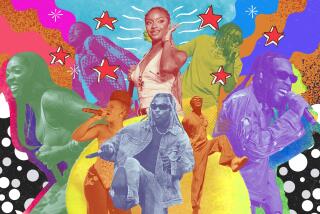King Sunny Ade “Juju Music” (1982)<i> Island</i>
- Share via
Hearing good African music live in Southern California has always been a tough proposition, but we’ve been going through a particularly dry spell lately. So it was heartening to hear that the Coach House was bringing King Sunny Ade back for a May 7 concert, and subsequently a big disappointment when Ade’s entire tour was canceled. Along with Ebenezer Obey and the lesser-known (in this country, at least) Dele Abiodun, Ade is one of the leading lights of juju music, a Nigerian popular style that marries rhythms and musical traditions of the Yoruba culture with a significant Western contribution, the electric guitar. In the early ‘80s, Island Records decided that Ade was ready for international success and released “Juju Music,” newly recorded versions of seven hits from Ades previous output of about 40 albums. Working with producer Martin Meissonnier, Ade created a perfect introduction to juju. More earthbound than the jangling guitar sound of Zairean zoukous or the keening Arabic-inflected vocals of the great Senegalese Youssou N’Dour, the songs on “Juju Music” intertwine the beats of several talking drums and other percussion instruments in extended, groove-oriented workouts.
The sweet, soulful vocals by Ade and a chorus of backup singers are set in complex, call-and-response interplay with the drums. Sung mostly in Yoruba, the songs range from the stripped-down, traditional “Mo Beru Agba” to the more lilting “Eje Nlo Gba Ara Mi.” Ade did indeed receive an unprecedented degree of U.S. and European acceptance for an African pop artist, and maintains a loyal following. Island, however, apparently was unsatisfied: It dropped him after three albums including the excellent “Synchro System,” which, like “Juju Music,” is still in print. Put them on Friday and dance.
More to Read
The biggest entertainment stories
Get our big stories about Hollywood, film, television, music, arts, culture and more right in your inbox as soon as they publish.
You may occasionally receive promotional content from the Los Angeles Times.








